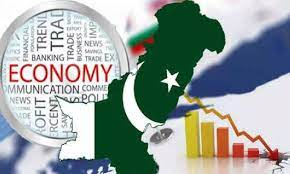This is why Pakistan is failing! | Downfall of Pakistan
Pakistan's economy has been facing significant challenges over the past few decades, with a consistent decline that has left many concerned about the future of the country. The economy has been struggling to keep pace with the rapidly growing population and is beset by a range of economic, political, and social factors. In this article, we will explore some of the key reasons why Pakistan's economy is falling consistently and what can be done to address these challenges.
Political Instability and Corruption
Political instability has been a long-standing issue in Pakistan, with frequent changes in government, military coups, and corruption scandals all contributing to the country's economic decline. The lack of continuity in economic policies and uncertainty over the country's political future have made it difficult for businesses to invest in Pakistan and create new jobs. In addition, corruption is pervasive throughout the country and has eroded public trust in government institutions and the economy.
1) Energy Crisis
Pakistan has been grappling with a severe energy crisis for many years, with the country facing frequent power outages and disruptions in energy supply. This has had a significant impact on the economy, as businesses have struggled to operate profitably and have been unable to compete with other countries in the region. The energy crisis is partly due to inadequate investment in the country's energy infrastructure and a lack of sustainable energy policies.
2) Inflation
Inflation has been a persistent problem in Pakistan's economy, with the country experiencing high rates of inflation for many years. The rising cost of basic necessities such as food and fuel has made it difficult for people to make ends meet and has led to a decline in consumer purchasing power. The high rates of inflation have also increased the cost of production for businesses, making it harder for them to remain competitive.
3) External Debt
Pakistan's external debt has been on the rise in recent years, and the country is struggling to repay its loans. The rising debt has led to a shortage of foreign exchange reserves, which has made it difficult for the country to import essential goods and services. This has also led to a decline in the value of the Pakistani rupee, which has made imports more expensive and reduced the country's export competitiveness.
4) Terrorism and Security Concerns
Pakistan has been grappling with terrorism and security concerns for many years, which has had a significant impact on the economy. The frequent incidents of violence have made it difficult for businesses to operate and for foreign investors to invest in the country. The decline in tourism due to security concerns has also had a significant impact on the economy.
Conclusion
Pakistan's economy is facing significant challenges, and urgent steps need to be taken to address these issues. The government needs to implement policies that promote economic growth and development and address the long-standing issues of political instability, corruption, and energy shortages. Sustainable energy policies and investment in the country's infrastructure will be critical to ensuring that Pakistan's economy can meet the needs of its growing population. Reducing inflation and managing external debt will also be important to ensure that the country's economic future remains secure. By addressing these challenges head-on, Pakistan can build a stronger and more prosperous economy that benefits all its citizens.


No comments:
Post a Comment